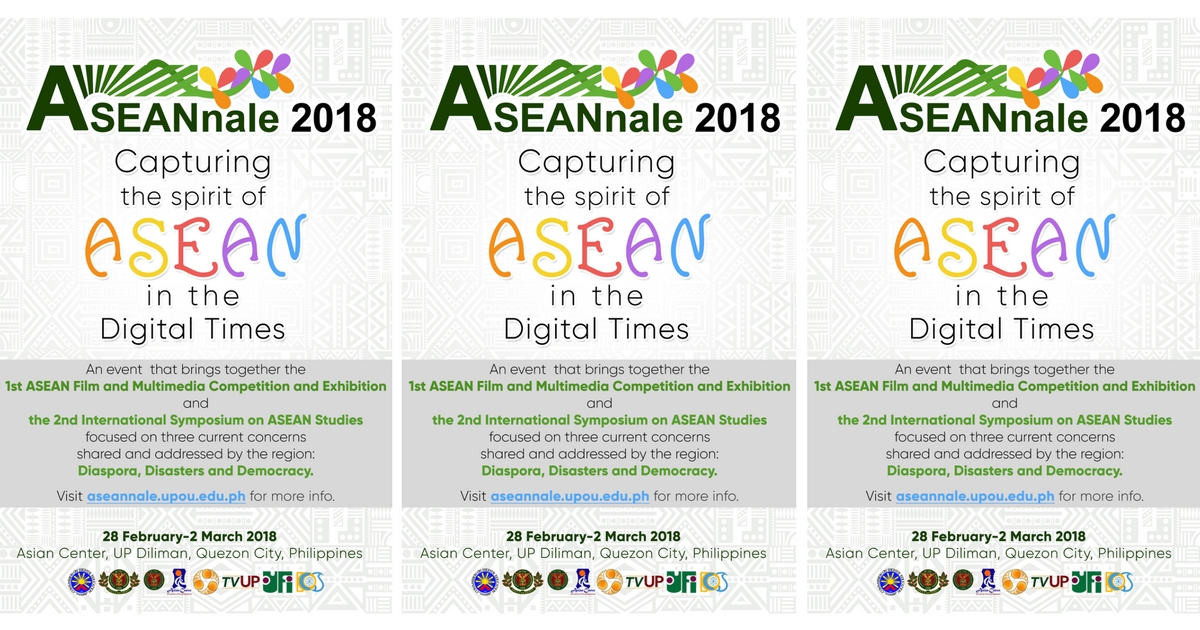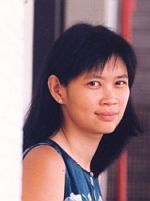 ASEANnale 2018, which brings together the 1st Film and Multimedia Competition and Exhibition and the 2nd International Symposium on ASEAN Studies (2nd ISAS), will be held from 28 February to 2 March 2018 at the Asian Center, University of the Philippines Diliman. Registration fees (PhP 3000) apply.
ASEANnale 2018, which brings together the 1st Film and Multimedia Competition and Exhibition and the 2nd International Symposium on ASEAN Studies (2nd ISAS), will be held from 28 February to 2 March 2018 at the Asian Center, University of the Philippines Diliman. Registration fees (PhP 3000) apply.
ASEANNale: AN OVERVIEW
The three-day event features presentations of research studies and film screenings based on three themes: Diaspora, Disaster, and Democracy. The theme of ASEANnale is “Capturing the ASEAN Spirit in Digital Times.”
There are three plenary sessions, and several panels each for every theme.
KEYNOTE ADDRESS
- Keynote Speech by H.E. Elizabeth Buensuceso (28 Feb, 9:30 am–10 am), Permament Representative of the Philippines to ASEAN
- Diaspora and Diversity: Temporary Migration and the Spaces of Difference (2 March, 9 am – 10 am) by Brenda S.A. Yeoh, Ph.D., Professor, Department of Geography, National University of Singapore
 While traditional migration research has privileged more permanent forms of migration and issues of settlement, adaptation and assimilation in host societies, the time-space compression brought about by rapid advancements in transport and communication technologies, as well as the flexibilisation of contemporary life and work cultures under neoliberal capitalist conditions, are beginning to move the focus to more temporary modes of migration, particularly in the Asian context. Migration as a household livelihood strategy or a pathway expressing personal aspiration is now within reach of an increasingly broad spectrum of socio-economic classes – professional and managerial elites, contract workers, undocumented migrants, student migrants, marriage migrants, retirement or lifestyle migrants, frequent flyers. In this context, by drawing people with different histories and geographies together in a space of flux, contemporary migration is a compelling force in increasing diversity in globalising cities. This presentation gives attention to the question of how encounters occurring amidst kaleidoscopic diversity may be differently shaped in a context where the political economy underpinning the migration regime is not necessarily dominated by notions of integration and assimilation as pathways to citizenship, as often pervades the broader imagination in the case in Europe. In Southeast Asian such as Singapore, migrant subjects are differentially incorporated into the nation’s geobody often along bifurcated lines: while talent migrants (i.e. highly skilled professionals and entrepreneurs) are incentivized to take up permanent residency or citizenship and lay down roots (however, many choose to remain highly mobile and “flexible” in their citizenship options), labour migrants, particularly those considered unskilled or performing 3D jobs, are locked into a “revolving-door” regime that enforces transience. It examines the processes of enclavement and encounter in the city, using the conceptual lenses of civility (and civil inattention), conviviality and cosmopolitan hope.[back to top]
While traditional migration research has privileged more permanent forms of migration and issues of settlement, adaptation and assimilation in host societies, the time-space compression brought about by rapid advancements in transport and communication technologies, as well as the flexibilisation of contemporary life and work cultures under neoliberal capitalist conditions, are beginning to move the focus to more temporary modes of migration, particularly in the Asian context. Migration as a household livelihood strategy or a pathway expressing personal aspiration is now within reach of an increasingly broad spectrum of socio-economic classes – professional and managerial elites, contract workers, undocumented migrants, student migrants, marriage migrants, retirement or lifestyle migrants, frequent flyers. In this context, by drawing people with different histories and geographies together in a space of flux, contemporary migration is a compelling force in increasing diversity in globalising cities. This presentation gives attention to the question of how encounters occurring amidst kaleidoscopic diversity may be differently shaped in a context where the political economy underpinning the migration regime is not necessarily dominated by notions of integration and assimilation as pathways to citizenship, as often pervades the broader imagination in the case in Europe. In Southeast Asian such as Singapore, migrant subjects are differentially incorporated into the nation’s geobody often along bifurcated lines: while talent migrants (i.e. highly skilled professionals and entrepreneurs) are incentivized to take up permanent residency or citizenship and lay down roots (however, many choose to remain highly mobile and “flexible” in their citizenship options), labour migrants, particularly those considered unskilled or performing 3D jobs, are locked into a “revolving-door” regime that enforces transience. It examines the processes of enclavement and encounter in the city, using the conceptual lenses of civility (and civil inattention), conviviality and cosmopolitan hope.[back to top]
PLENARY SESSIONS
- Diaspora Panel (28 Feb, 1:30 pm–3:00 pm)
- Dr. Nguyen Thi Hoai Phoung (Lecturer, Vietnam National University)
- Dr. Orlando Mercado (Secretary-General, Eastern Regional Organization for Public Administration, Philippines)
- The Democracy Panel (1 March, 9 am–10 am)
- Dr. Suthipand Chirathivat (Director of the ASEAN Studies Center, Chulalongkorn University, Thailand)
- Girard Philip Bonotan (Senior Officer, Culture and Information Division, ASEAN Secretariat)
- The Disaster Panel (1 March, 1:30 pm–3:00 pm)
- Dr. Alfredo Mahar Francisco Lagmay (Director, Nationwide Operational Assessment of Hazards)
- Dr. Zenaida Beltejar (Head, Social Welfare Development, Philippine Red Cross)
- Dr. Edimon Ginting Susantono (Director of Economic Analysis and Operational Support Division, Asian Development Bank)
- Dr. Sheila Bonito (Professor, UP Open University, Dean of the College of Nursing, UP Manila)
PAPER PRESENTATIONS
There are thirteen (13) papers all in all in the Diaspora panels, twelve (12) in the Democracy Panels, and eight (8) in the Disaster Panels. An additional panel, Digital Spaces, will have six (6) papers.
FILM SCREENINGS
Films, documentaries, and other multimedia content for each area—Diaspora, Democracy, and Disaster—will be shown in the auditorium.
VENUE, VICINITY, MAP and INQUIRIES and REGISTRATION
To register online, visit the ASEANNALE Registration page. Registration fees of PhP 3,000 pesos apply for the three-day event.
For directions to the venue, please view this vicinity map. For inquiries, kindly contact 981.8500 local 2663 or local 3679; or 9263465; or via email: This email address is being protected from spambots. You need JavaScript enabled to view it..
To learn more about the conference, visit the ASEANnale 2018 website. [back to top]
The UP Asian Center offers M.A. degrees in Asian Studies with four fields of specialization: Northeast Asia, Southeast Asia, South Asia, and West Asia. The Center also has an M.A. program in Philippine Studies that allows students to major in Philippine society and culture, Philippine foreign relations, or Philippine development studies. The Center offers a Ph.D. program in Philippine Studies in conjunction with the College of Arts and Letters and the College of Social Sciences and Philosophy. Get an overview of these programs. The Asian Center also houses a peer-reviewed, open-access journal, Asian Studies: Journal of Critical Perspectives on Asia. It has published several books and monographs, and hosts or organizes various lectures and conferences.

